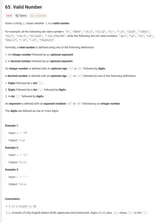Anonymous
9/7/2025, 4:12:30 AM
No.106508374
>>106508592
>>106508681
>>106508710
>>106508792
>>106508822
>>106508828
>>106508949
>>106508960
>>106509191
>>106509284
>>106509501
>too many edge cases
>mental breakdown and brain stops functioning in the interview
wat do?
>mental breakdown and brain stops functioning in the interview
wat do?

